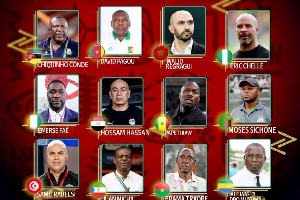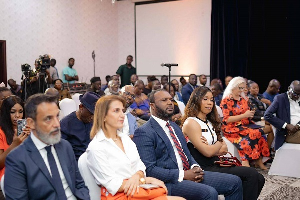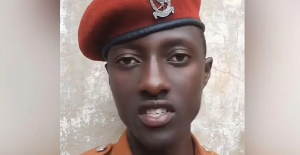The paramount reason is to secure the stability of Ghana as enshrined in the Spirit of Freedom and Justice, by way of securing the respect and usefulness of the 1992 Constitution, which is sort to be overthrown by the majority judgments of the Supreme Court’s decision on the just ended 2012 Election Petition.
It is the duty of every patriotic citizen of the nation to seek to overturn the verdict as it stands, not just to obtaining different result as on who is or becomes the president, but to defend the substance and the survival of the Constitution, as it seeks by its Spirit to subject this beloved nation under the Sovereign owner, God, whose core tenet is freedom and justice for all who seek the Truth and the Light.
This very verdict from the beginning has been the goal by JSC Atubuga, per his reasoning as contained in his judgment. I do not seek to malign Atuguba, JSC, for it is up to God to judge each judge and everyone else, as person or judge, but by virtue of my crusade to defend the constitution, it need be that the work of the hand of the Devil, as expressed under the hand of Atuguba ,need be exposed.
In Ghana, or perhaps Africa, it is a common trade for many professions to create an aura mystery and beyond the common-person belief around them. This is the common strategy by which many professions monopolize and exploit the general populace to their own advantage. The Bar, by the Supreme Court and some lawyers had intensified this campaign during those month of the Petition, even raising the status of judges to that of some gods, and making every mind to seem foolish or shallow that which in not legally trained. But God is so generous that He has set one law, one set of wisdom which is called Common Sense. As it is common, this wisdom is plain and its codes common to all, and the mother of all wisdom and knowledge. Thus, it makes it very difficult for even a stark of darkness to hide under its plain, simple, and transparent wings. It is like the daylight, where whatever is done under its plane is seen by all.
Thus with my simple plain non-legal mind, I was set to peruse the reasoning and judgment of JSC Atuguba. For starters, I must say that this judge is good in his trade. In fact he is well-read, and very commanding and thus comfortable in what he does. Contrary to the difficulty with which he seems in expressing himself verbally; his command of the tools of his trade is in no doubt. In fact he could be one of the well-read legal minds that ever lived. However, if you have read my last article, ’Ken Korankye and the Supreme Court’, we discussed some preamble of being a good judge, or passing good judgment. I take leave to bring an except to the fore, which is very relevant to this discourse:
“This is because truly, there is a legitimate interesting dichotomy as per the case of Mr. Korankye. I, myself, even as an angel (upon my own volition, not that of the Lord) could make compelling arguments in favor or against both the stands of Mr. Korankye; and that of the Court. However, true judgment does not necessarily hinge on objectivity, even though to be objective is such a sought-after tenet which is very elusive to many. To be objective is to have a goal or task (an objective) to fulfill. This means that based on some premise, which is the sole prerogative of yours as the judge, you then use all the favorable ammunitions available in support of your set objective, while abandoning wittingly or otherwise the ones that go against your position. Therefore to be a good judge demands more than objectivity (that suffices for an advocate, say a lawyer). In this wise, to be a good judge in whatever respect, before God, who is the only infallible true arbiter, is to be first assailed with LOVE, which in turn would balance you on the scale of true MOTIVE (good intent). Remember also that the motive must be borne of the facts or substance of the case. And when you are set with true motive, since even the Devil himself profess to love the Light (the Truth), or attest to its goodness…. then you are good to faithfully deliver your judgment to effect that compelling true Motive (for there could be many other good intents, but the one which best does justice on the occasion).”
What then was motive of Atuguba from the onset of the Petition upon which he sought to arbitrate the case? Was his motive a true motive (good) to do justice as borne by the facts, and substance of the case? And how did he seek to effect his motive. Our attempt to answering these questions may not be seriatim.
First the motive of JSC Atuguba is set out clearly on page 39 of his judgment under the heading ‘PRINCIPLES OF ANNULING RESULTS’ – I quote: ‘For starters I would say that the Judiciary in Ghana, like its counterparts in other jurisdictions, does not readily invalidate public elections but often strives in the public interest, to sustain it.’
Thus from the beginning JSC Atuguba was set to employ and deploy all the ammunitions, fair and foul, to defend the status-quo; this he says, because it has been the practice of Ghana Judiciary. This assertion or motive raises many questions. First is it morally and legally right to be prejudiced on a case without the merits of the substance of it? Two, is it wholly true that the norm of the Judiciary has been to often sustain?
. Three, is it true that it is often in the public interest to sustain result of public elections irrespective of the conduct of the said election. I leave you to deliberate on these, but I say that given the circumstance the motive of Atuguba to this case and judgment is bad and false. JSC Atuguba says again, under the heading ‘THE ENFORCEMENT OF THE CONSTITUTION, page 45, ‘In modern times the courts do not apply or enforce the words of a statues but their objects purposes and core values. Our constitution incorporates its spirit as shown for example, in article 19 (4) (d). This the justice was justifying those who voted without fingerprint biometric verification. Well said, what is there then at article 19 (4) (d) of the constitution?:
(4) Nothing in this article shall prevent Parliament from enacting laws that
are reasonably necessary to provide -
(a) for the implementation of policies and programmes aimed at
redressing social, economic or educational imbalance in the
Ghanaian society;
(b) for matters relating to adoption, marriage, divorce, burial, and
devolution of property on death or other matters of personal law;
(c) for the imposition of restrictions on the acquisition of land by
persons who are not citizens of Ghana or on the political and economic activities of such persons and for other matters relating
to such persons; or
(d) for making different provision for different communities
having regard to their special circumstances not being provision
which is inconsistent with the spirit of this Constitution.
The clause itself prohibits such an outrageous application per the judgment of the judge: ‘not being provision which is inconsistent with the spirit of this Constitution.’ Even granted Atuguba’s interpretation, it still does not apply appropriately to the ‘voting without finger biometric verification’ scenario of the 2012 election. The true interpretation would mean that haven identified that a certain community have finger biometric verification problem, some CI or rule is then made before the election to exempt the said community, like the FO (face only) provision was made. It does not however, allow the changing or making of the rule in the middle of the game; and definitely does not grant some people the leeway to vote; haven refused others with same problem. This flies in the face of the spirit of the constitution; and the clause itself prohibits such a discriminately application. One cannot also, in the face of the FO provision, speak as though, such provision as he alludes, was never made at all. This application flouts the spirit of Equality and Justice, and the Rule of Law. If a rule could be abandoned midway, then better the rule was not made. The same ‘spirit’ application was made in throwing out the case of ‘no signature of preceding officer’. We must remember that as much as it is good to seek to applying the Law in the spiritual context you cannot also spiritualize everything, because without the letter no one could decipher the spirit; and the letter is the proportional compliance to the spirit is the very safeguard of the Law. Therefore profuse spiritualization of the Law is collapsing of the same because the spirit is neither void nor devoid of the flesh.
What is the spirit of the constitution? Below is the extract of, and the spirit of the constitution, the preamble:
‘IN THE NAME OF THE ALMIGHTY GOD
We the People of Ghana,
IN EXERCISE of our natural and inalienable right to establish a framework of
government, which shall secure for ourselves, and posterity the blessings of liberty,
equality of opportunity and prosperity;
IN A SPIRIT of friendship and peace with all peoples of the world;
AND IN SOLEMN declaration and affirmation of our commitment to;
Freedom, Justice, Probity and Accountability;
The Principle that all powers of Government spring from the Sovereign Will of the
People;
The Principle of Universal Adult Suffrage;
The Rule of Law;
The protection and preservation of Fundamental Human Rights and Freedoms, Unity and
Stability for our Nation;’
The Case of Non-Signatures
The justice haven determined beforehand to uphold the EC’s declaration set to use profusion of inappropriate international and local precedents to defend the indefensible by badly complicating that which was a simple matter of covert election fraud. Many of the precedents were against his case or at best neither here nor there. The judgment is a made up of a maze of cuts, twists and turns to rape and overthrow even such a simple but entrenched provision as article 49 (3)
(1) At any public election or referendum, voting shall be by secret ballot.
(2) Immediately after the close of the poll, the presiding officer shall, in
the presence of such of the candidates or their representatives and their
polling agents as are present, proceed to count, at that polling station, the
ballot papers of that station and record the votes cast in favour of each
candidate or question.
(3) The presiding officer, the candidates or their representatives and, in the
case of a referendum, the parties contesting or their agents and the polling
agents if any, shall then sign a declaration stating -
(a) the polling station; and
(b) the number of votes cast in favour of each candidate or
question: and the presiding officer shall, there and then, announce the result of the voting at the polling station before communicating
them to the returning officer.
This is what the justice has to say:
‘It is undoubtable that in some instances the declared results were not signed by the
presiding officer though the petitioners’ polling agents did sign. The crucial
question that has devastated this court is whether those results should be annulled.
To arrive at an answer to this question a number of considerations are relevant. To
some minds the sacred nature of the constitution and the clarity of article 49 so far
as the requirement of the presiding officer’s signature is concerned warrant the
unmitigated annulment of the votes involved. Quite clearly however this has not
been the approach of this court and its predecessors to constitutional construction
or application’.
And then he went ahead to give a maze of authorities and precedents to make his case. But the simple interpretation of the original clause mean ‘no signature no declaration’ (shall then sign a declaration stating,), therefore any disobeying declaration (without signature) is null and void! If you do not know as a lay person, I tell you even precedents are not bigger than the constitution that it seeks to interpret and apply. In fact, precedents are for both revision and a bad example that says ‘this was badly done, don’t repeat it or don’t do it this same way’, as also to a guideline. However, it seems to me that to many a Ghanaian legal minds, precedent means ‘always do it this way’.
The profuse use of precedents is a very lazy and robotic way of doing adjudication. Two cases are never exactly the same as time, culture, fashion or contemporary vogue and many others could make difference in the adjudication of even the same case. It also means that all that you do is that when there is a case before you, you then determine who to vote for and fish all supporting precedents (even non-supporting precedents, like is in this our case), and heap them as cast judgment. According to JSC Atuguba, the court has always sought to sustain public elections, therefore even when the conduct of an election records violations that touch the core of the constitution such as happened in the 2012 election, judges must move all mountains to sustain the unsustainable. This very assertion even if it is true, means judges have always betrayed the Spirits and Letter of the very constitution that says ‘Freedom, Justice, Probity and Accountability’. Where was the Probity in JSC Atuguba and the liked-minded judges, where is the Accountability in the judgment which they have delivered against the Petition? Did they seek to do Justice when after they have said there were enough material to deliver their judgment, but now two-timely argue that the Pink Sheet is not enough of a material to prove the said violations? Didn’t they have in their power to avail themselves with the necessary materials that would have helped them to ascertaining the truth? Was this Petition not in the public interest such that they had the duty to even going beyond the parties presentations in finding the truth? However, for some reasons known to some of the justices all they did were an absurdity of flimsy apologetics for the case of the respondents to the detriment of the constitution, and the Rule of Law; Probity and Accountability; and against the people of Ghana; and God.
Those justices must know that though the Law lies in their bosoms they definitely are not the Law. That the Law (the constitution) is what has made them what they are in society. That for them to turn around and violate the constitution in this manner by their judgment is not only a shot in their own feet, but a very dangerous pathway to the breakdown of law and order. That the problem is not so much of the electoral system (since no system is foolproof), but that the courts are there to check the abuses that any public system may suffer from sloppy officers or unscrupulous persons. Now what they are telling us is that you can steal and go free so long as you don’t get caught in the act.
In conclusion, this verdict has set us on a self distractive path; and that any patriotic citizen must do his/her bit to help set aside this dangerous precedent. We must understand that though the Bar populates the court but the court is ultimately the people’s property; and that there are good justices in the court who given the chance would do justice. More so, people learn from mistakes, and that it would not surprise me that the same judges who failed to deliver justice might do so upon second chance. This is the reasons why the NPP must do their bit to defending the people’s constitution by availing the country of a review. Otherwise, even should the NPP come to power; they might have to do so by violating the constitution as has happened. And if such continues, one day we might wake up to see our false peace exploded in our face. Notwithstanding, all must watch out for the Hand of God in this beloved nation.
Opinions of Thursday, 12 September 2013
Columnist: Boamah, Ebenezer














